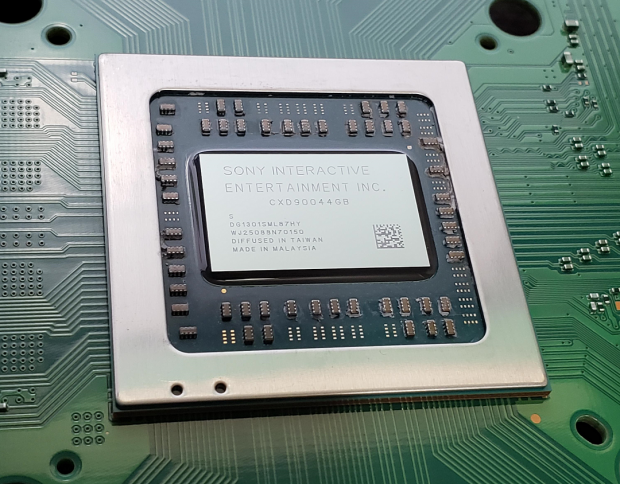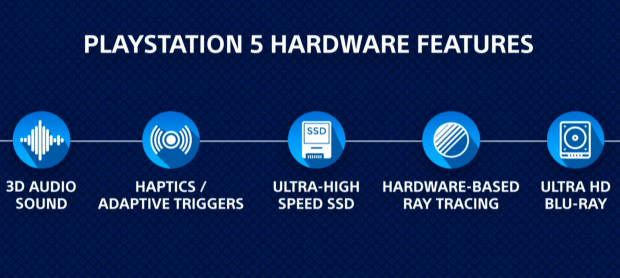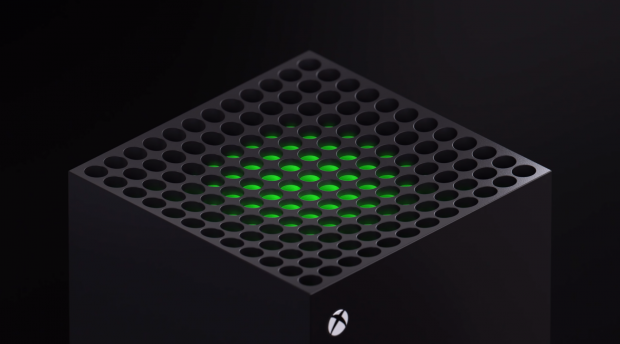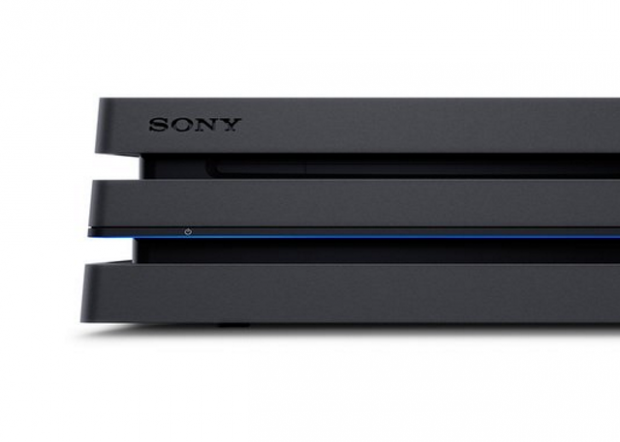Key industry trends give us major clues on how gaming's billion-dollar titans will approach next-gen game releases, including backwards compatibility, PS5 and Xbox SX ports, and other key business models.

Ubisoft, EA, Activision-Blizzard, Capcom, Take-Two Interactive--all the major publishers are gearing their projects for next-gen consoles. So what can we expect with upcoming games? Nearly every major publisher says they're working on next-gen games. But will they also come to current-gen systems? Most likely yes. Will every current-gen game get re-released? Probably not. But then again every publisher loves the opportunity to re-release and re-sell their games (the Switch is proof of this, as is the early remaster fusillade that accompanied the PS4 and Xbox One).
To make the most out of next-gen without disrupting current-gen, devs have to occupy both the present and the future at the same time. This could mean many things, whether it be launching their games simultaneously on both generations, embracing layered cross-play, and picking and choosing which titles get re-released on the PS5 and Xbox Series X.

Read Also: Ubisoft confirms support for next- and current-gen consoles
Backwards compatibility
First, let's talk about how the present will carry over into the new generation of console hardware.
There's two main mechanisms to carrying current-gen forward on next-gen, and make no mistake, this carrying forward will happen. There's no way Sony and Microsoft are just going to throw away their respective 100 million+ and 50 million+ install base ecosystem. The PlayStation 5 and Xbox Series X are both extensions and evolutions of the PlayStation 4 and Xbox One family, and both Microsoft and Sony have confirmed next-gen won't instantly phase out current-gen. PS4 and Xbox One systems will live alongside PS5 and Xbox SX for years.
The two mechanisms are re-releases of current-gen games that're re-tooled and optimized for PS5 and Xbox Series X, and native backward compatibility of current-gen games on next-gen systems.
When it comes to specifics, publisher's plans depend on things we don't know yet.
The biggest of which is ease of development, but some devs say the PS5 in particular is effortless to make games on. Whether or not certain games get re-released onto PS5 and Xbox Series X, or whether they are even supported via backward compatibility, depends on how much work devs have to put in.
The PlayStation 5 and Xbox Series X feature huge hardware upgrades over existing systems. Both have a powerful new AMD SoC outfitted with a Zen 2 CPU and Navi GPU to enable high FPS gaming in 1080p and 4K, and even offers 8K max resolution. The system also allows for new graphical enhancements like ray tracing and new techniques like variable rate shading, which slightly reduces image quality to boost frame rates.
Despite this hardware leap, everything I've seen over the past year or so of reporting tells me both the PlayStation 5 and Xbox Series X will have full backward compatibility with current-gen games. The real question is what kind of backward compatibility it is, but more on that later.
The PlayStation 5 in particular has a built-in GPU mode that natively emulates a PlayStation 4's CPU and GPU speeds. And Microsoft has confirmed that four generations of Xbox games are playable on the Xbox Series X.
But there's multiple layers to backward compatibility that we need to consider.
- Native backward compatibility - PS5 and Xbox Series X may not require any kind of patches or updates to play PS4 and Xbox One games. As mentioned above, the PS5 appears to have native BC support. How far this native support goes remains to be seen, but expect first-party heavy-hitters and the console's best games. I'd like to think native BC will allow all games to be played, but again we don't know that for sure.
- Enhanced backward compatibility - Developers may step in and release enhancement patches for current-gen games so they play, feel, and look better on next-gen consoles. Think of this like the Xbox One X / PlayStation Pro Enhanced patches that devs launched to push 4K visuals and HDR on the iterative systems.
Read Also: Battlefield 6 to 'blow people's minds' on next-gen consoles

Re-releases on next-gen consoles
Next, let's talk about how the present will carry over into the future insofar as games.
Devs could simply rely on native backward compatibility for their games and leave it at that. But it's more likely they'll pick and choose some of their best current-gen games to re-release onto next-gen systems as PS5 and Xbox Series X exclusive ports of the games.
This way publishers get even more sales revenue especially during the critical holiday period.
But again, this totally depends on the complexity of updating older games to new systems, and whether or not publishers want to re-market and re-distribute these games. Logically, I feel the best way to do this is to simply add digital enhancement patches to existing current-gen games and then change up the retail boxes for said games to say "PS4 and PS5 supported," similar to Microsoft's retail game box rebranding with Xbox 360 backward compatibility on the Xbox One.
If re-releases do happen, some games are more likely to get re-launched than others. Not every game will probably make the cut simply because it'd be too costly, both in manpower and
Current-gen games most likely to be re-released/ported to PlayStation 5, Xbox Series X:
- Live games - Publishers are more likely to spend on live game re-launches on PS5 and Xbox Series X because they make money over time. Games like Overwatch, Rainbow Six Siege, Monster Hunter World, Battlefront II, Fortnite, Call of Duty, and Destiny should make the cut.
- Popular games - This goes without saying. Devs now have to make games for up to eight systems at once in 2020, so their attention is spread thin. Publishers would only select the heavy-hitters for re-releases, kind of like the games in the old-school Greatest Hits label. Games like GTA V and first-party heavy-hitters on Sony's and Microsoft's labels are key contenders. This also goes hand in hand with live games.
If a publisher has a popular live game, then it's of course more likely to cross-over.
Read Also: Next-gen console exclusives will be few and far between through 2021

Cross-generation harmony
Next we have to consider how the two systems will live alongside each other, and this means cross-gen ports.
Publishers are far less likely to release next-gen exclusive ports of their biggest AAA games. We'll most likely see new games launch on both PS5/Xbox Series X and PS4/Xbox One to maximize sales, exposure, and overall monetization potential. Next-gen offers a new opportunity to sell (or resell) on a new platform, which is extremely potent for games-makers.
Again, there's two ways this could happen: With a dual-SKU launch that sees two versions of games released for both current- and next-gen systems, or a single base current-gen SKU that's marked as "PlayStation 5 supported" on the box.
The latter option would basically automatically download enhancement patches when you stick the disc into a next-gen system. Or come with the files baked in when you download it digitally, activated by each respective system's intelligent delivery systems.
One of the biggest things publishers have to consider is cross-generation play. This is 100% necessary and almost goes without saying. Whether or not PS5 and Xbox Series X players will get an edge thanks to higher FPS remains to be seen, but publishers absolutely have to connect the generations together on a network, service, and software level to maximize potential earnings and monetization opportunities.
Combined with general cross-play with console users and PC gamers, this will help spark tons of engagement, which is something that benefits everyone: developers, publishers, Sony, Microsoft, you name it.
All of these features of expanded support are critical to ensure a smooth transition between console cycles, and Sony and Microsoft are eager to provide tools to make this as easy as possible for developers.
Xbox Series X is due out by Holiday 2020. No pricing has been announced.
Check below for confirmed specs and details, and a huge content listing of everything we've heard about Xbox Series X so far:

Xbox Series X confirmed details (Formerly Project Scarlett):
- 8-core, 16-thread Zen 2 CPU
- Navi GPU on RDNA architecture
- Highly customized 7nm SoC from AMD
- GDDR6 memory
- 2x Xbox One X's 6TFLOPs of GPU perf
- 4x CPU power of Xbox One generation
- Can deliver up to 40x more performance than Xbox One in specific use cases
- Adaptive sync supported
- Super-fast SSD that can be used as VRAM
- Supports 8K resolution (likely media playback)
- 120FPS gaming
- Variable refresh rate (adaptive sync/FreeSync)
- Variable Rate Shading
- Raytracing confirmed with dedicated raytracing cores
- Backward compatible with thousands of Xbox, Xbox 360, and Xbox One games
- New controller with a dedicated share button
- Compatible with Xbox One accessories
Lockhart (Unconfirmed lower-end Xbox Series hardware)
- 1440p 60FPS
- No disc drive
- Super-fast SSD that can be used as VRAM
- 7nm AMD SoC w/ scaled-down 8-core, 16 thread Zen 2 CPU at 3.5GHZ and Navi GPU
- Lower GDDR6 memory pool (Possibly 12GB)
- ~6-8 TFLOPs of power?
- Aims to rival PS4 Pro/Replace Xbox One S
- Full backward compatibility with all Xbox One games
- Cheaper MSRP
Anaconda/Xbox Series X/Project Scarlett
- 4K 60FPS
- Disc drive with 4K UHD playback
- Super-fast SSD that can be used as VRAM
- 7nm AMD SoC with 8-core, 16 thread Zen 2 CPU at 3.5GHz and Navi GPU
- 16GB GDDR6 RAM
- 12 TFLOPs of power
- 2x GPU power as Xbox One X/aims to replace Xbox One X
- Full backward compatibility with all Xbox One games
- More expensive MSRP
Xbox Series X coverage:
- AMD unknown APU: is this the mid-range Xbox Series S chip?
- Xbox Series X SSD: DRAM-less PCIe 4.0 NVMe with up to 3.7GB/sec speeds
- First photo of an Xbox Series X prototype has leaked
- Next-gen console exclusives will be few and far between through 2021
- No, Xbox Series X won't run Steam or the Epic Store
- Ex-Xbox VP won't buy next-gen Xbox, will play exclusives on PC instead
- Xbox Series X HDMI pass-through currently not supported
- New Xbox Series X renders show ventilation and back ports
- Xbox Series X new die shot teases beautiful AMD custom 7nm APU
- Analyst: $500 Xbox Series X will take wind out of Microsoft's sails
- PlayStation 5 to outsell Xbox Series X in 2020, analyst predicts
- Xbox Lockhart going digital-only at launch would be a mistake
- Xbox Series X new die shot teases beautiful AMD custom 7nm APU
- Xbox Series X will destroy PlayStation 5 with its MUCH faster GPU
- Xbox Series X rumor: launching November 22 for $499
- Xbox Series X GPU is better than any Navi GPU released so far
- Xbox Series X may be more powerful, but will third-party devs use it?
- Xbox Series X will boost performance of previous gen Xbox games
- PS5, Xbox Series X SSD may use software-defined flash to boost speeds
- Microsoft to 'virtually eliminate' loading times on Xbox Series X
- How the Xbox Series X will look in your living room
- Clarifying the Xbox Series X name
- Xbox Series X's custom SoC built with backward compatibility in mind
- Next-gen Forza is playable on Xbox Series X, is 'vastly different'
- Xbox Series X size comparison vs Xbox One, PS4 Pro, Switch
- Next-gen Xbox controller has a share button
- Xbox Series X naming scheme leaves door open for Lockhart
- Xbox Series X may allow suspend and resume for multiple games at once
- Microsoft reveals next-gen Xbox console, the Xbox Series X
- Xbox Series X may allow suspend and resume for multiple games at once
- Next-gen Xbox Lockhart has 'significantly less RAM' for 1440p gaming
- Next-gen Xbox Scarlett specs: 12TFLOPs, 16GB RAM, 3.5GHz Zen 2 CPU
- Cheaper next-gen Xbox Lockhart targets 1440p 60FPS
- Cheaper next-gen Xbox Lockhart targets 1440p 60FPS
- Project Scarlett devkits aren't widely available yet
- PS5, Xbox Scarlett SSD may use Optane-like ReRAM to supercharge speeds
- NVIDIA G-Sync monitors to improve PlayStation 5 and Xbox Scarlett
- Project Scarlett won't get VR gaming, Microsoft doesn't care about VR
- Next-gen Xbox Scarlett plays four generations of Xbox games
- Microsoft teases next-gen Xbox: 8K, 120FPS, super-fast SSD
- Xbox Scarlett CPU: 'no compromises', allows for 4K 120FPS gaming
- Microsoft: Xbox Scarlett will kick PlayStation 5's ass in perf/price
- Next-gen Xbox may hit 4K 60FPS in every game
- Project Scarlett to hit 1080p 120FPS gaming
- Project Scarlett trade-in program announced, but there's a big catch
- New Viking Assassin's Creed may be next-gen console launch game
- Next-gen Xbox may get room-scale VR gaming
- PS5 and Xbox Scarlett will both handle ray tracing differently
- Gears 5 developer says Xbox Scarlett has dedicated ray tracing cores
- GTA 6 on PS5, Project Scarlett to have insane hyper-realistic visuals
- AMD 'Flute': Xbox Scarlett SoC: Zen 2 8C/16T @ 3.2GHz on 7nm
- Project Scarlett's price isn't locked in yet
- Project Scarlett isn't the last Xbox console
The console will release in Holiday 2020, and it may cost $499.
Check below for more info on everything we know about the PlayStation 5 so far:

PlayStation 5 specs and details:
- Custom SoC with second-gen Navi GPU, Zen 2 CPU
- 8-Core, 16-thread Zen 2 CPU at 3.2GHz
- Navi GPU at 2.0GHz with 36 Compute Units
- Navi, Zen SoC uses new AMD RDNA 2.0 architecture
- Ultra-fast SSD
- Support for 4K 120 Hz TVs
- Ray-tracing enabled
- 8K output support (for gaming)
- Plays all PS4 games
- Separate games that ship on BD-XL Blu-ray discs
- New controller with extensive haptic and tactile feedback
PlayStation 5 Coverage:
- PlayStation 5 could use Samsung's 980 QVO SSDs
- PlayStation 5 is beating Xbox Series X in dev kit form right now
- Hardly any devs are making next-gen PS5, Xbox Series X games
- Sony working on new horror IP for PlayStation 5
- PlayStation 5 devkit UI possibly leaked
- Leaked PlayStation 5 concepts show weird X-shaped case
- Sony's first-party PS4 exclusives are coming to PC
- PlayStation 5's new DualShock 5 may be usable on PS4
- Sony skips E3 2020, has two major events planned for February
- Next-gen console exclusives will be few and far between through 2021
- PlayStation 5's biggest features have yet to be announced, Sony says
- PS4 has sold over 1 billion games and 106 million consoles
- PlayStation 5 backward compatibility should support every PS4 game
- Sony reveals the PlayStation 5...logo
- New trapezoidal PS5 render is an expensive accident waiting to happen
- A $399 PlayStation 5 will conquer next-gen
- PlayStation 5 to outsell Xbox Series X in 2020, analyst predicts
- PS5 may only enhance PS4 games, legacy PS1, PS2 and PS3 games unlikely
- PlayStation 5 prototype dev kit console gets V-shaped clean
- Sony: The future is coming at CES 2020
- PlayStation 5 GPU: 9.2 TFLOPs with 36 custom Navi compute units
- PlayStation 5 GPU emulates PS4, PS4 Pro with special modes
- PS5, Xbox Series X SSD may use software-defined flash to boost speeds
- PS5's SSD is 'exceptionally powerful,' may beat Xbox Series X speeds
- DualShock 5 renders show new trigger design, USB-C, ergonomic shell
- PlayStation 5 to support 8K gaming, Sony confirms
- New PlayStation 5 renders show off radical different design, again
- Leaked PlayStation 5 ad prices console at $1,000, is totally fake
- Sony seeks a new Head of Strategy for Worldwide Studios
- Leaked PlayStation 5 devkit photos show new DualShock controller
- PS5, Xbox Scarlett SSD may use Optane-like ReRAM to supercharge speeds
- NVIDIA G-Sync monitors to improve PlayStation 5 and Xbox Scarlett
- PlayStation 5: Everything We Know So Far
- PlayStation 5 confirmed to have 8C/16T Zen 2 CPU from AMD
- PS5, Project Scarlett may use Samsung's 6th gen V-NAND NVMe SSDs
- PS5 backward compatibility confirmed, will play PS4 games
- Sony's next-gen PlayStation 5 has 4K 120Hz output support
- PS5, Project Scarlett to hit over 10TFLOPs of power, sources say
- PS4 will be supported into 2022, to live alongside PS5
- Sony: ultra-high-speed SSD is 'the key' to next-gen PS5
- PS5 dev kit rumor: 'ultra-fast RAM', Navi GPU with 13 TFLOPs
- PlayStation 5 rumored to ship with 2TB of super-fast SSD for $499
- Insider: PlayStation 5 dev kit faster than Xbox Scarlett right now
- PS5 cartridges aren't real, patents are for Sony kids toys
- PS5's SSD may benefit PS4 games the most
- PS5 powered by Navi in 2020, AMD making Navi with Sony input
- Cloud-powered PlayStation controller may let you play free game demos
- Gran Turismo 7 is a PlayStation 5 launch title: launches Nov 20, 2020
- PS5 confirmed to support 8K video, ray tracing, all on Navi
- PlayStation 5 rumored to cost $499, launches November 20, 2020
- PlayStation game demos are coming back with Sony's ambitious new plan
- PS5 controller: Built-in mic, USB-C, no lightbar, ergonomic design
- PlayStation 5 concept video shows totally new design
- Sony solves PS5's biggest issue
- Sony: PS5 development going according to plan
- New Viking Assassin's Creed may be next-gen console launch game
- AMD working on 'secret sauce' for next-gen Xbox/PlayStation
- The first real photo of a PlayStation 5 dev kit appears
- Next-gen PS5/Xbox Scarlett open-world game: 'best real-time graphics'
- Sony restructures workforce to prepare for PS5
- PlayStation VR 2: built-in cameras, wireless, ready for PS5
- PS5 games will ship on 100GB Blu-ray BDXL discs
- PS5 and Xbox Scarlett will both handle ray tracing differently
- PlayStation 5 could feature AI-powered 'PlayStation Assist'
- Sony won't abandon singleplayer story-driven games on PS5
- PS5 rumor: GPU is nearly as powerful as RTX 2080, GPU clocked at 2GHz
- PlayStation 5 rumored to be unveiled on February 12, 2020
- Sony to raise PS5 cost thanks to U.S. tariffs


